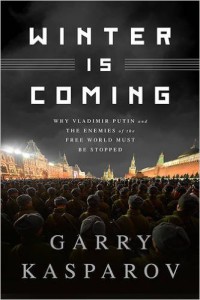“Just as when analyzing a chess game, what we call the postmortem, talking as if everything was going just fine until this or that event is usually absurd and harmful to the process of honest analysis,” states Garry Kasparov in his new book Winter Is Coming, the first of an intended trilogy published in late October by Public Affairs with a title inspired by Game of Thrones. “Of course huge isolated blunders in otherwise good positions do occur, but they are even rarer in diplomacy than in world championship chess.”
The former world chess champion, who reigned from 1985 through 2000 and earned the esteemed title Grandmaster in the process, defeated foes both human (physically anyway, intellectually they were closer to superhuman)-such as his chief foe Anatoly Karpov-and mechanical, splitting a pair of matches with IBM supercomputer Deep Blue. Having retired from chess in 2005 to join the Russian Pro-Democracy Movement and emigrated to New York in 2013 to become chairman of the Human Rights Foundation, the adversary Kasparov has focused his attention on for the last decade is some unholy melding of man and machine.
Exploring the overarching theme of whether monsters are born or made, without reverting to psychological armchair debates over nature vs. nurture, Kasparov expertly states the case for how Vladimir Putin has gone from a Russian problem to a regional problem to a global problem. He begins his book with a look at the failed August Coup in 1991 wherein Soviet loyalists attempted to overthrow Mikhail Gorbachev whose aim was to build “socialism with a human face.” The always keen-minded and critical-thinking Kasparov, who was a card-carrying yet openly reproachful member of the Communist Party for purposes of furthering his chess career before revoking his constituency in 1990, counters that “Frankenstein’s monster also had a human face.” Like a modern-day Doctor Frankenstein (Victor or Henry depending on what source material you draw from, Mary Shelley’s novel or James Whale’s Universal films) Putin has been busy about reassembling a patchwork Soviet-style empire through annexations, military operations, occupations, and ethnic cleansing within Chechnya, Georgia, Ukraine, and Crimea without so much as the pretense of ideological justification.
When Putin was hand-picked by Gorbachev’s successor Boris Yeltsin to supplant him in 1999, the ex-KGB Lt. Colonel initially took office with public support, including that of the chess master himself. “Physical and social insecurity have always been easy targets in fragile democracies,” says Kasparov. It did not take long for Putin to reveal himself, boldly and largely unchecked, as the godfather of a mafia state whose motto is “let’s steal together”. And if you are not with Putin, you are most decidedly against him.
As Kasparov illustrates throughout Winter Is Coming, the international community has stood passively by while Putin runs roughshod over his independent neighbors in a manner reminiscent of Neville Chamberlain’s appeasement of Adolf Hitler. What is worse, the United Nations has become, as Winston Churchill worriedly prophesied in 1946, “a cockpit in a Tower of Babel”, permitting Putin to reshape boundaries and rewrite history. Kasparov’s proposal calls for the adoption of a “global Magna Carta, a declaration of fundamental rights that all members must recognize” whereby we “turn principles into policies”. He admits that “our challenge is to overcome our weakness without losing the values the enemies of the free world fear so much.”
Kasparov rightfully does not shy away from the inclusion of Putin with the genocidal likes of Hitler, Stalin, Mao Tse Tung, Pol Pot, and Slobodan Milosevic. “Evil does not die,” Garry writes, “just as history does not end.” Indeed, the current state of affairs in Russia was made possible on the watch of world leaders who, in the heady days of Perestroika in the 1980s, contented themselves with, and in some cases congratulated themselves for, the lifting of the Iron Curtain and dismantling of the Berlin Wall from a safe distance and with little to no regard given to the potential consequences. The United States, for instance, adopted what Kasparov calls a “too big to lose” stance toward a then largely unrestricted Russia which seemed all too happy to begin “throwing good money after bad.” This practice became standard operating under our last two administrations which have been complicit through their inaction while Putin has scowled, made open threats, crushed revolutions, murdered with impunity, and sat upon a stockpile of nuclear weaponry and the materials with which to assemble them that have on occasion simply worryingly gone missing.
At the height of their chess rivalry, full-blooded Russian Anatoly Karpov was hailed as being “of respectable stock” while Kasparov, born in Azerbaijan’s capital city of Baku to a Jewish father and Armenian mother (who hung a sign on Garry’s childhood bedroom wall which read If Not You, Who Else?), was described as a genetically “explosive combination”. Kasparov being his mother’s family name, Garry’s patronymic Weinstein was sometimes wielded as an insult to be utilized disparagingly against him personally in the Russian press. This speaks to the rampant anti-Semitism still very pervasive throughout the culture and which walks hand in hand with a state-mandated intolerance toward the LGBT community. Kasparov elected to give a 1989 interview to Playboy magazine which would have been controversial enough in its own right seeing as though the publication was then banned in the Soviet Union. The fact that he used the platform to take the tenets of Communism to task while expressing admiration for American Capitalist values put him on further unstable footing with the Soviet national sports authority. His subversive activities heightened in Glasnost-era 1991 when he served for five years as chairman of then independently owned and operated Echo of Moscow radio station and its burgeoning website. In a typically Russian conflict of interest, Echo of Moscow is now owned by gas and energy giant Gazprom.
As a leader of the anti-establishment Other Russia, Kasparov won its 2008 primary for consideration in the presidential election, pragmatically aware that it amounted to little more than a public protest. Opposition parties were, after all-in Garry’s words, “banned from media, slandered, prohibited from holding meetings and rallies, frequently physically assaulted, raided and harassed by police, blocked from appearing on ballots.” The result of Russia’s 2008 presidential election was a badly performed vaudevillian routine featuring puppeteer Vladimir Putin, constitutionally unable to serve more than two consecutive terms, and his ventriloquist’s dummy Dmitry Medvedev who appeared to be doing the talking and yet it was impossible not to see
Putin’s lips moving. Medvedev kept Vlad’s presidential seat warm for four years until it could be reoccupied (for six year terms now) during which time, as Kasparov jokes in the book, Dmitry probably had to ask permission from Prime Minister Putin to use the Kremlin restroom.
His brazen outspokenness on the Putin dictatorship puts Garry Kasparov in the dangerous company of those who have paid heavy costs and, in certain instances, the ultimate price for their heroic audacity in exposing its crimes against humanity. Journalist Anna Politkovskaya, who wrote extensively on the Putin administration and Chechen War and was shot dead in her apartment building on October 7, 2006 (Putin’s birthday). Alexander Litvinenko, former FSB (Russia’s Secret Service) officer turned British citizen, author, and whistleblower who died from exposure to the radioactive element polonium-210. Mikhail Khodorkovsky, once the wealthiest man in Russia thanks to his acquisition of the Yukos oil company but was imprisoned and relieved of his shares which were carved up and sold off at bargain basement prices to Putin cronies. Former Yeltsin Deputy Prime Minister Boris Nemtsov who had been co-chairman of the Republican Party of Russia-People’s Freedom Party and a friend of Kasparov’s at the time of his death this past February, gunned down within sight of Red Square. Nadezhda Tolokonnikova and Maria Alyokhina of the all-female punk protest collective Pussy Riot who were each sentenced to two years in labor camps on charges of hooliganism (a third member, Yekaterina Samutsevich, was released on a technicality) for performing a portion of their song “Mother of God, Chase Putin Away” on the altar of Moscow’s Cathedral of Christ the Savior while wearing mismatched and vibrantly-colored tunics, balaclavas, and tights. Kasparov was beaten by police on the streets outside of the courtroom in which the women were being arraigned and was summarily arrested then put on trial for unsanctioned protest.
“I am looking for the same thing everyone else is. A normal life,” says Kasparov of the universal dream. “Where a person can live well and express himself well. It’s very important for me to try to bring the normal life to my people. The daylight.”
Order the BOOK HERE
[si-contact-form form=’3′]

 November 10th, 2015
November 10th, 2015  CEO
CEO 
 Posted in
Posted in  Tags:
Tags: 



